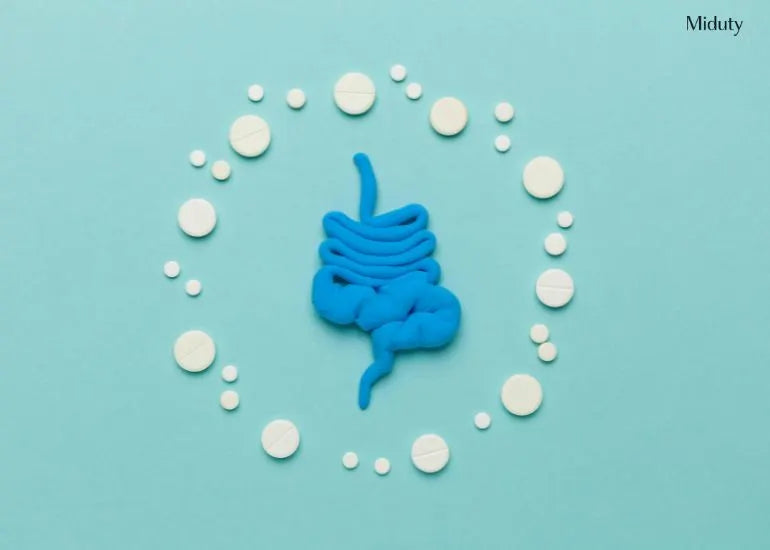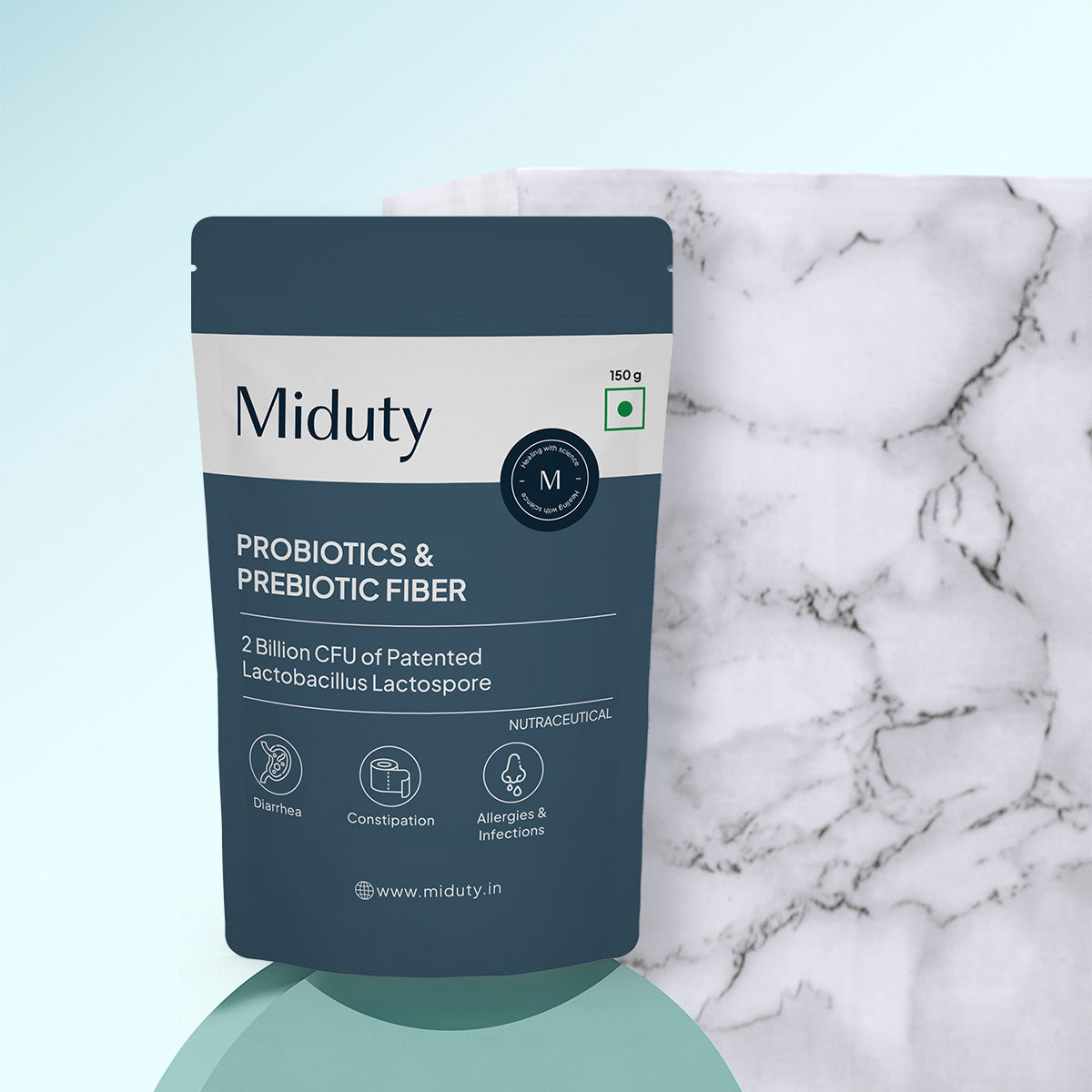
Top 7 Benefits of Probiotics for Kids
As parents, we're always looking for ways to help our kids grow strong, healthy, and happy. From ensuring they eat balanced meals to making sure they get enough sleep and exercise, every choice we make contributes to their well-being. In recent years, one topic has gained increasing attention among pediatricians and parents alike — probiotics.
Often referred to as "good bacteria," probiotics are living microorganisms that support gut health, digestion, and immunity. While the idea of giving bacteria to children might sound counterintuitive at first, research increasingly shows that probiotics can offer numerous benefits for kids — from fewer tummy troubles to stronger immune systems and even better moods.
In this post, we'll explore what probiotics are, how they work, their potential benefits for children, and how to safely include them in your child's diet.
Key Takeaways
1. Probiotics Support Digestive and Immune Health : Probiotics help balance the gut microbiome, improving digestion, reducing constipation and diarrhea, and strengthening the immune system since around 70% of immune function originates in the gut.
2. They Help Reduce Side Effects of Antibiotics: Taking probiotics during or after antibiotic treatment can replenish healthy gut bacteria, lowering the risk of antibiotic-associated diarrhea and helping kids recover more comfortably.
3. Probiotics May Reduce Allergies and Skin Issues: Certain probiotic strains, such as Lactobacillus rhamnosus GG and Bifidobacterium breve, may help lower the risk of eczema and allergic reactions by promoting a balanced immune response in children.
4. A Healthy Gut Can Improve Mood and Nutrient Absorption: The gut-brain connection means probiotics can influence mood, focus, and sleep. They also enhance nutrient absorption, ensuring better intake of key vitamins and minerals for growth and development.
5. Safe, Everyday Ways to Include Probiotics: Parents can add probiotics to their child's routine through foods like yogurt, kefir, and miso, or through pediatric supplements. Probiotics are generally safe for healthy kids but should be introduced under a doctor's guidance.
What Are Probiotics?
Probiotics are live microorganisms — primarily bacteria and yeasts — that provide health benefits when consumed in adequate amounts. They naturally exist in our digestive tract and help maintain a healthy balance between good and bad bacteria.
When that balance is disrupted — due to illness, antibiotics, poor diet, or stress — kids may experience digestive problems, weakened immunity, and other issues. Probiotics help restore this balance by replenishing the gut microbiome with beneficial bacteria.
Some of the most common probiotic strains include:
- Lactobacillus – Supports digestion and helps with lactose intolerance.
- Bifidobacterium – Aids in digestion and boosts immune function.
- Saccharomyces boulardii – A beneficial yeast that helps manage diarrhea and intestinal infections.
These strains are often found in fermented foods such as yogurt, kefir, sauerkraut, miso, and kimchi, or in dietary supplements designed specifically for children.
Why Gut Health Matters for Kids?
A child's gut is home to trillions of microorganisms that form a complex ecosystem known as the gut microbiome. This community plays a crucial role in digestion, nutrient absorption, and immune defense. Surprisingly, scientists have also discovered strong links between gut health and brain function — often referred to as the gut-brain axis.
During the early years of life, a child's microbiome is still developing. Factors like birth method (vaginal vs. C-section), feeding type (breast milk vs. formula), antibiotic use, and dietary diversity can all shape how this microbiome forms. Ensuring a healthy balance early on may help prevent allergies, digestive issues, and even mood disorders later in life.
That's where probiotics can play an important role — they help cultivate a more resilient and balanced gut microbiome during these formative years.
Top 7 Benefits of Probiotics for Kids
Let's dive deeper into how probiotics can support your child's overall health and well-being.
1. Improved Digestive Health
Children commonly experience digestive discomfort — from occasional constipation to diarrhea or bloating. Probiotics can help regulate bowel movements and maintain smooth digestion by supporting a balanced gut flora. [1]
For example:
- Lactobacillus rhamnosus GG (LGG) has been shown to reduce the duration of diarrhea caused by infections or antibiotics.
- Bifidobacterium infantis helps ease constipation and improve stool consistency in children.
Regular intake of probiotics can make digestion smoother and reduce tummy troubles that often disrupt your child's comfort and daily activities.
2. Fewer Antibiotic Side Effects
Antibiotics are sometimes necessary to treat bacterial infections, but they can also kill off beneficial bacteria in the gut, leading to diarrhea or yeast overgrowth.
Probiotics help replenish the healthy bacteria that antibiotics destroy, reducing the risk of antibiotic-associated diarrhea (AAD). Studies suggest that children who take probiotics during or after antibiotic treatment experience fewer side effects and recover faster.
If your child is prescribed antibiotics, it's worth discussing with your pediatrician whether adding a probiotic supplement could help maintain gut balance.
3. Stronger Immune System
Did you know that around 70% of the immune system resides in the gut? A balanced microbiome acts as a front-line defense, preventing harmful pathogens from taking hold.
Probiotics help stimulate immune cells, boost the production of natural antibodies, and improve the body's response to infections. Some research even suggests that children who regularly consume probiotics may experience:
- Fewer respiratory infections (like colds)
- Reduced incidence of ear infections
- Shorter recovery times from illness
Especially during the school year, when kids are exposed to countless germs, probiotics can provide valuable immune support. [2]
4. Reduced Risk of Eczema and Allergies
Emerging studies indicate that probiotics may play a role in reducing the risk of eczema and certain allergies in children. By promoting a balanced immune response, probiotics may help prevent the overreactions that trigger allergic inflammation.
For instance, Bifidobacterium breve and Lactobacillus rhamnosus GG have been linked to lower rates of eczema in infants, particularly when introduced early in life. While not a guaranteed cure, probiotics can be a helpful part of a broader strategy for managing allergy-prone children.
5. Better Mood and Behavior
The gut-brain connection is one of the most exciting areas of research in child health. Scientists now understand that gut bacteria produce neurotransmitters such as serotonin and dopamine, which influence mood, behavior, and cognitive function. [3]
A balanced microbiome can help regulate emotional well-being and reduce anxiety or irritability. Although research in children is still developing, some studies suggest that probiotics may support focus, mood stability, and even sleep quality. In other words, a healthy gut might mean a happier child — both emotionally and physically.
6. Enhanced Nutrient Absorption
Probiotics also play a behind-the-scenes role in helping the body absorb essential nutrients like vitamin B12, calcium, magnesium, and iron. A healthy gut ensures these nutrients are efficiently extracted from food and delivered to the body, supporting proper growth and development.
This can be particularly beneficial for picky eaters, who might not always get a well-rounded diet.
7. Support for Healthy Weight Management
Recent research indicates that the gut microbiome can influence metabolism and weight. While this area is still being studied, maintaining a balanced gut through probiotics may help regulate appetite and reduce inflammation that contributes to unhealthy weight gain.
Encouraging a healthy gut flora early in life may set the stage for better metabolic health in the long run.
How to Give Probiotics to Kids?
There are two main ways to include probiotics in your child's daily routine:
1. Probiotic-Rich Foods
Encourage your kids to enjoy naturally fermented foods such as:
- Yogurt with live cultures
- Kefir (a tangy fermented milk drink)
- Miso soup
- Tempeh
- Sauerkraut or kimchi (for older kids)
- Probiotic-enriched cheese or smoothies
These foods not only add beneficial bacteria but also supply important nutrients like calcium and protein.
2. Probiotic Supplements
If your child doesn't eat enough fermented foods, supplements can be a convenient option. They come in forms such as powders, chewables, or liquid drops — often flavored for kids.
Tips for choosing a probiotic supplement:
- Look for strains like Lactobacillus rhamnosus GG or Bifidobacterium lactis, which have been well studied in children.
- Check for a CFU count (colony-forming units) between 1–10 billion for general use.
- Ensure the product is third-party tested for quality and safety.
- Always consult your pediatrician before introducing new supplements.
Are Probiotics Safe for Kids?
For most healthy children, probiotics are considered safe and well-tolerated. Mild side effects such as temporary bloating or gas may occur when first starting, but these typically resolve as the gut adjusts. However, if your child has a weakened immune system, chronic illness, or was born prematurely, you should consult your healthcare provider before giving probiotics.
Final Thoughts
The idea that bacteria can help our children thrive might seem surprising, but science continues to confirm the powerful connection between the gut and overall health. From reducing digestive discomfort to boosting immunity and even supporting mood, probiotics can be a valuable ally in raising healthy, resilient kids.
By introducing probiotic-rich foods or supplements into your child's daily routine — under the guidance of a healthcare professional — you're taking an important step toward nurturing not just a healthy gut, but a stronger foundation for lifelong wellness.
FAQ's on Probiotics Benefits for Kids -
Q1 - What do probiotics do for kids?
Probiotics help support children's health by maintaining a healthy balance of good bacteria in the gut. This balance promotes better digestion and can help relieve common issues such as diarrhea, gas, and constipation. In addition, probiotics strengthen the immune system, which may lower the risk of infections and allergies. They also improve nutrient absorption, playing an important role in a child's overall growth and development.
Q2 - Can probiotics help kids' mood?
Yes, probiotics may help enhance children's mood through the gut-brain axis — the connection between the gut and the brain that allows gut bacteria to influence mood and mental function. A balanced gut microbiome supports the production of neurotransmitters like serotonin, which play a key role in mood regulation. Research also indicates that greater gut bacteria diversity is linked to improved mood, curiosity, and social behavior in toddlers.
Q3 - How quickly do probiotics work in kids?
Probiotics may start to show results within a few days for minor digestive issues, but noticeable, long-term benefits typically appear after two to four weeks of consistent use. Some children might experience improvements sooner, while others may need a longer period for benefits such as better digestion and overall gut health to fully develop.
Q4 - Do probiotics help children sleep?
Yes, probiotics may support better sleep in children by influencing the gut-brain axis, which helps regulate neurotransmitters such as serotonin and melatonin, both important for healthy sleep patterns. Research indicates that a balanced gut microbiome can positively affect sleep quality, though more studies are needed to fully understand the effects of probiotics in children. Natural sources of probiotics include foods like yogurt, kefir, and sauerkraut.
Q5 - Can we give probiotics to kids daily?
Yes, some pediatricians may recommend daily probiotic use for children, but it's important to consult a healthcare professional first to ensure the right type, dosage, and duration based on your child's individual needs. Alternatively, offering probiotic-rich foods such as yogurt is a safe and natural way to support a healthy gut microbiome.
Q6 - What's the best way to give probiotics to kids?
The best way to give probiotics to children is through probiotic-rich foods such as yogurt, kefir, and fermented vegetables, which are generally preferred over supplements. If supplements are needed, choose a child-specific product and mix powdered forms into foods or drinks like smoothies or applesauce to make them easier to take. Always consult a pediatrician before starting any probiotic supplement, and avoid exposing probiotics to high heat or acidic foods, as these can destroy the beneficial bacteria.
References














